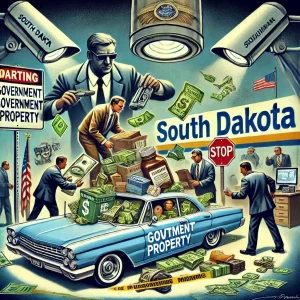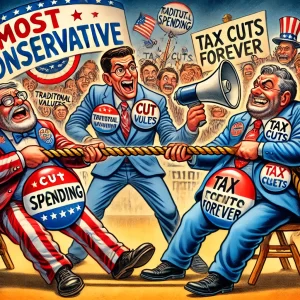State leaders fail to protect public assets
South Dakota’s state government has a troubling history of fraud incidents. However, 2024 marked a new low. Investigations last year implicated state employees in schemes that mismanaged or outright stole millions in public funds. The officials entrusted with safeguarding these assets — through robust systems, oversight and enforcement — seem to have failed the public.
Voters elect representatives to run state government responsibly and professionally. However, mounting evidence suggests systemic failures by leaders and legislators, raising critical questions about accountability.
Who’s minding the store?
South Dakota Attorney General Marty Jackley has been busy recently, announcing fraud investigation after fraud investigation involving state employees. Three people are currently being prosecuted, one has pleaded guilty, and another two died before their behavior fully came to light. It appears there has been a complete breakdown of oversight and internal controls.
While the fraudsters are directly to blame and should be prosecuted for violating public trust, the failures don’t stop there. Those responsible for implementing internal controls and oversight systems have also let us down.
So, who has been steering state government over the past decade or two? The finger points to a string of elected Republican leaders along with a Legislature that has seemingly been asleep at the wheel.

2024: A big year for fraud
Among the investigations announced last year, one case in the Department of Revenue involves the alleged forging of motor vehicle titles to get hundreds of thousands of dollars of bank loans. Meanwhile, $1.78 million was allegedly stolen over more than a decade from the state’s child protection program.
These incidents are just the latest in a sordid history of fraud that underscores deep flaws in the state’s oversight mechanisms.
A troubling legacy of fraud
South Dakota’s recent scandals are not isolated events but part of a troubling long-term pattern. Here are some others.
- Gear Up Scandal (2015): This scandal involved the mismanagement and embezzlement of millions in federal education funds through shell companies and falsified financial documents. The case ended in tragedy when one key figure murdered his family before taking his own life.
- EB-5 Scandal (2013-14): This one involved the misappropriation of investments and state funds in a federal program for economic development. The controversy culminated in the apparent suicide of a former state official.
- Northern Beef Packers Scandal (2013): A planned beef packing plant that received millions in state and federal funds failed, mired in allegations of fraud and insider deals.
Each scandal highlights significant lapses in oversight, transparency, and accountability. South Dakota has a fraud problem.
Too little, too late
The 2024 scandals have prompted recent legislative and administrative proposals aimed at strengthening oversight. Attorney General Jackley plans to propose new fraud protections this winter. Governor Noem has added an internal control officer and mandated annual training for state employees. The state auditor has pledged to revise procedures, and the legislature seeks answers, though it typically faces resistance from state agencies when it starts questioning operations.
While these measures sound promising, voters have little reason to believe they will effectively address the problem. Perhaps the state would benefit from involving fraud prevention experts. It also raises the question: why weren’t these measures implemented sooner? South Dakota’s history of fraud should have served as a clear warning.
Fraud may be inevitable
South Dakota’s chronic fraud problems may be inevitable. The state prides itself in its lean approach to government, prioritizing budget cuts and minimal spending. And the state’s closed primary election system encourages elected officials and candidates to try to outdo one another in proving their frugality and conservatism.

However, this minimalist approach to government often leaves critical oversight and auditing functions underfunded. So public assets are left unguarded and vulnerable to bad actors.
South Dakota voters deserve both answers and action. If leaders continue prioritizing reactive measures over systemic reform, the cycle of mismanagement and scandal will persist. It’s time for elected officials to deliver the accountability they’ve long promised.
As I learned during the SD GEAR UP scandal in the previous decade, state government strives to push accountability down through the ranks and, whenever possible, outward to consultants and contractors. The accountability culture begins at the top, with senior executive branch employees who serve at the pleasure of the governor (e.g., cabinet secretaries and their direct reports).
I made a proposal (in a five-page double-spaced memo) sent to all state legislators several years ago. My proposal would either expand the mandate of the SD State Auditor and the legislature’s GOAC or create a companion agency modeled on the Auditor’s office that would explicitly oversee the executive branch’s program operations. Needless to say, few legislators understood and there was no passion to address the lack of accountability processes for senior executives in state government.
The dwindling news media also has a watchdog role in covering state government, and South Dakota operates in notoriously closed fashion. One has to wonder how many fraudsters have never been detected.